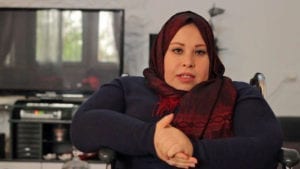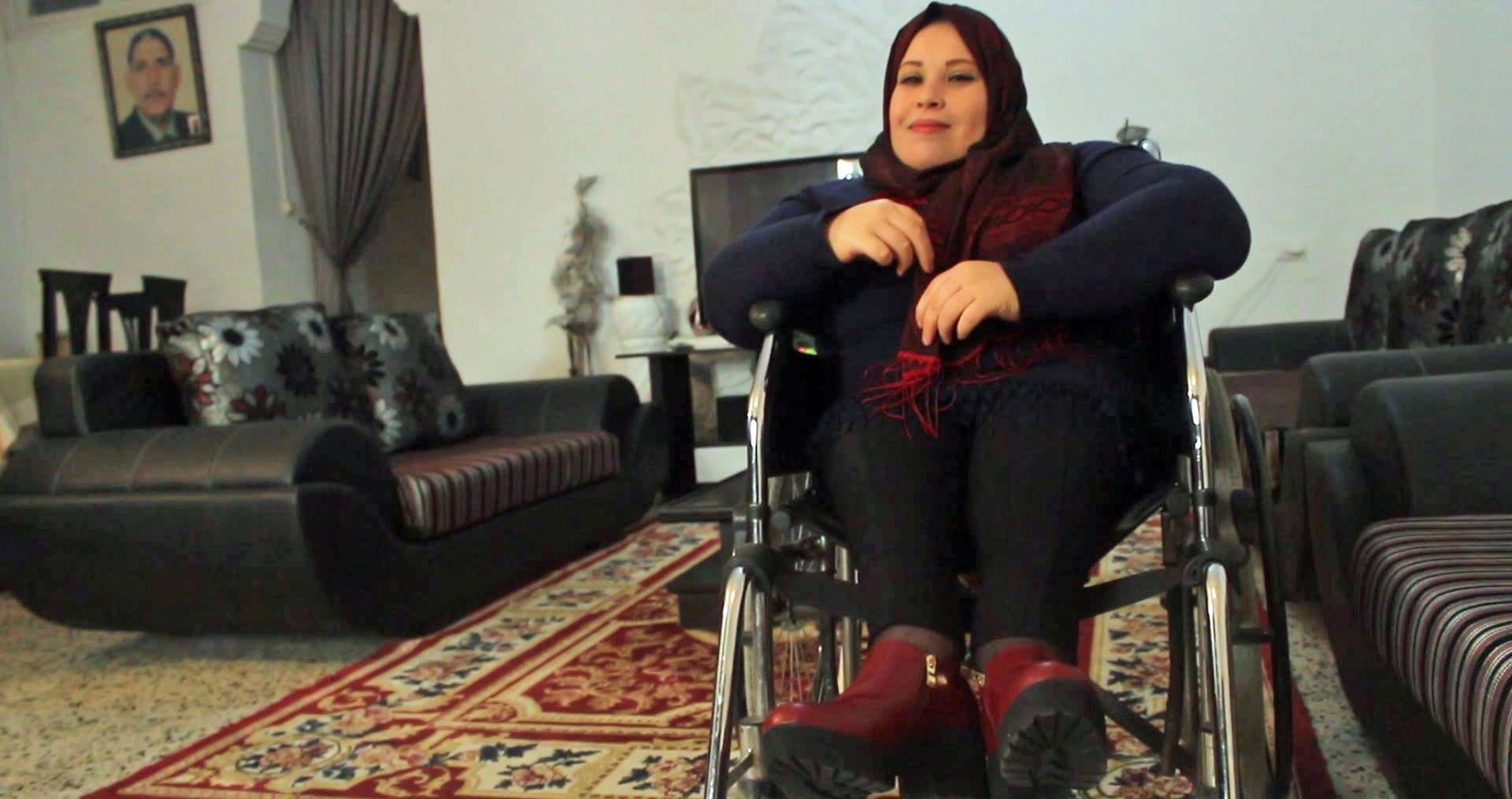Sana Sabheni, 32, is confined to a wheelchair at her home in a four-story apartment complex in Tunisia. She does not leave her apartment for months at a time because her building does not have an elevator. Without resources to enable her mobility, Sabheni, who lives with her elderly mother, must crawl down two flights of stairs to reach street level. From there, she depends upon someone to carry her wheelchair down to her and push her through the streets. Lacking basic provisions for accessibility, she is unable to hold a good job or engage in everyday life.

Through Solidarity Center assistance, Sabheni now has an electric wheelchair and the possibility of employment. Credit: Houcem Manai
Sabheni was among 1,601 participants in Solidarity Center surveys among workers with disabilities in Morocco and Tunisia. Conducted in partnership with Union Marocaine du Travail (UMT), Union Generales des Travailleurs Tunisiens (UGTT), and the Arab Forum for the Rights of Persons with Disabilities, the surveys are the first of their kind to examine how workers with disabilities and unions can address discrimination and lack of accessibility for workers in North Africa. The experiences of Sabheni and other workers with disabilities reveal how a powerful combination of discrimination, lack of appropriate accommodation and poor enforcement of existing laws deprives persons with disabilities of good jobs.
While the World Health Organization (WHO) reports that persons with disabilities account for 15 percent of the global population, in the Arab world unemployment rates for persons with disabilities can be as high as 90 percent. The Solidarity Center studies find that efforts to improve employment among persons with disabilities focus on “make-work” programs that rely on local charities rather than address accessibility. As a result, workers with disabilities often are marginalized into informal economy jobs with little access to workplace rights through unions.
Although legislation in both Morocco and Tunisia establishes hiring quotas for persons with disabilities, the surveys’ results suggest most private-sector employers pay little heed to this law and labor inspections have proven inadequate in forcing compliance.
Women with Disabilities also Challenged by Sexism
Sabheni now has an electric wheelchair and the promise of employment, the result of Solidarity Center partners’ support with support from Lilia Makhlouf from the Ministry of Employment and Vocational Training, and the generosity of a local businesswoman. Sabheni must still manage two flights of stairs on her own but once at the lower level of her building, she is able to access her new wheelchair and independent life outside her building.
Yet most persons with disabilities in North Africa will face immense obstacles to finding good jobs. In particular, women with disabilities are challenged by the double burden of sexism and ableism. For North African women, sexual harassment, violence, and other forms of abuse mean job opportunities can be both scarce and exploitative.
Reflecting on survey results, Nahla Sayadi, coordinator of the Women’s Committee in Monastir, Tunisia, and a member of the UGTT, summarized the dire conditions facing women with disabilities at work, in both Tunisia and Morocco.
“Even within the category of workers with disabilities, men have significantly better conditions than women,” she said “The rate of sexual harassment is shocking. Women with disabilities at work are subjected to exploitation—as workers, as disabled, and especially as women—three times as often.”
Unions the Strongest Voices for Rights of Workers with Disabilities
Sayadi touches on an important aspect of the struggle for disability rights at work. As an issue that is at once invisible and highly intersectional, disability rights can be a difficult subject around which to help workers form unions. Workers with disabilities may feel particularly beholden to their employers or otherwise fear reprisal, leaving them reluctant to speak out for their rights. By working alongside civil society groups, rights activists, and union leaders to complete these landmark studies, the Solidarity Center assembled a strong coalition committed to supporting workers with disabilities.
“[The study] has given me a lot of energy to continue my struggle as a trade unionist and activist,” Sayadi concluded.
The ILO reported in a recent review that labor unions are already the strongest voices advocating for the rights of persons with disabilities at work around the world. Public-sector unions, where survey data shows persons with disabilities experience higher levels of union representation and are natural organizers around rights issues because of their position at the nexus of governance and work. Armed with unprecedented data on the subject, union allies are now better prepared to fulfill this role across North Africa.
Following the studies, which were funded by the Ford Foundation, 13 workers with disabilities contacted the UMT in Morocco to learn more about the union and their rights as workers. In Tunisia, the study brought 82 workers with disabilities into the UGTT. Working with a regional labor movement committed to building inclusivity, the Solidarity Center is empowering persons with disabilities to exercise their rights as workers in a region where they face dynamic challenges to finding decent work.

